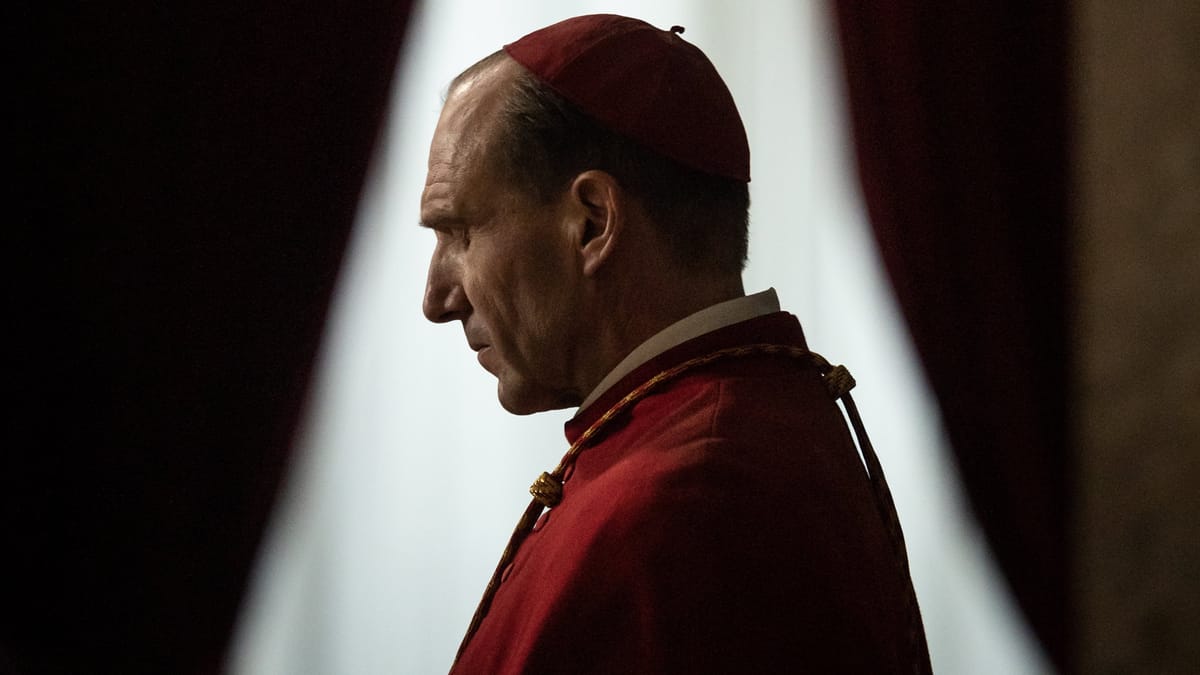Conclave
"Every bishop has already chosen the name of their papacy."

The selection of a new Pope is inherently based on a contradiction.
Men of the cloth are expected to be humble, to put aside their ego in a radical demonstration of selflessness in which nothing, not even the Church itself, takes precedence over service to and honor of God. Yet leadership positions require some personal ambition to attain and retain: those who seek them necessarily believe they have something to offer that no one else does. They harbor the conviction that not only is their way the right way, others should follow them. Given the centrality of religion in the lives of many, such leadership positions hold incredible power, and thus are most attractive to those least well suited to them. Some denominations of Christianity avoid this through various decentralized structures. But of course, not the Catholics. The oldest Christian denomination copied what was the most widespread form of rule of its day: a monarchy...sort of.
The key difference, and the driving force of Robert Harris' 2016 novel on which Edward Berger's film is based, is when choosing their "head of state". All of the bishops convene in Rome to engage in a series of votes until the required two-thirds majority is achieved. They go through ballot after ballot, proceeding directly from one to the next, breaking only for meals and sleep and worship. It's quite reminiscent of the way the United States House of Representatives goes about choosing the Speaker of the House, a parallel which was likely on Berger's mind given the events of January 2023, just a few weeks before filming commenced1.
It's unsettling how many parallels to those chaotic days emerge as the bishops deadlock time and time again. Ideological factions form and dissolve, deals are cut, strategies are discussed, nationalism and "traditionalism" rear their ugly heads, and the lust for power is laid bare. The activity reads less like a meeting of potential Popes than it does one of the national political party's conventions. The cafeteria sees the collected sitting with their countrymen, ostensibly respectable men behave like high school cliques, and rumors start to swirl before the late Pope's body is even cold.
Our POV is that of Dean Thomas Lawrence (Ralph Fiennes), a British cardinal whose title situates him as responsible for overseeing the conclave. As such, we're privy to all the gossip, as well as a small trickle of outside information as he tries to ascertain if any of the claims hold enough water to functionally disqualify them. There were last second meetings with the Pope whose nature is in dispute, the sudden arrival of a cardinal from Kabul (Benitez, played by Carlos Diehz in his film debut) whom no one knew about but seems legit, and the emergence of unspecified "reports" which evoke the numerous sexual abuse scandals roiling the Church for the past twenty years or so. Candidates rise and fall, compromises are made, and the voting rolls on, keeping viewers on the edge of their seats.
The broader ideals, the push and pull, and the way this Pope's election is pitched as an existential threat to the social progress made by the Church over the past sixty years all links it pretty directly to the current political climate in the United States, where we're less than two weeks away from a Presidential election in which one of the candidates is wannabe dictator who romanticizes the "good old days". The timing of the film's release, and the way in which the more conservative candidate Tedesco (Sergio Castellitto) is discussed, makes it clear that Berger has his eye on that race and felt it important to say his piece.
That said, he does not sacrifice entertainment value to do so. All of the players are distinct, and deep character development is not limited to those in the foreground, as head nun Sister Agnes (Isabella Rossellini) has a small yet crucial role to play, which sets in motion the events which will lead to the resolution of the deadlock. Everyone is giving it their all, even if there are occasions on which the pitch of the performances reveals the novel's bones as an airport thriller. Each person's desires and values come through as their plotlines weave around each other with Lawrence at their nexus. Volker Bertelmann's score is going wild, driving up our heartbeats with every musical phrase, certainly en route to another Best Original Score nomination. The indiividual votes are genuinely tense, made even more so after an early shaking of the building informs us of violence being committed by some "supporters" in the square (to what end, we're unsure).
The intrigue which emerges is kinetic if unimportant, each vote punctuated by the ceremonial burning of the ballots and release of colored smoke to denote whether a winner has been selected. It's all somewhat perfunctory by that point, as the movie long ago telegraphed who he would be. But it hardly matters, as the narrative is well constructed, relying on your enjoyment of the journey and spending time with the characters far more than being mystified by the outcome. To that end, it has more than a few tricks up its sleeve that will keep you locked in from start to finish. The final result is a pulpy story masquerading as a prestige drama with enough frills and gestures at bigger ideas that it mostly pulls it off.
While Berger is German and has lived in Berlin for nearly thirty years, he lived and worked in the states for a time in the 90s, and many of the main cast in this film are American. Not to mention his interest in politics, as highlighted by his 2022 film All Quiet on the Western Front.↩